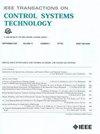A Sparse ADMM-Based Solver for Linear MPC Subject to Terminal Quadratic Constraint
IF 4.9
2区 计算机科学
Q1 AUTOMATION & CONTROL SYSTEMS
引用次数: 0
Abstract
Model predictive control (MPC) typically includes a terminal constraint to guarantee stability of the closed-loop system under nominal conditions. In linear MPC, this constraint is generally taken on a polyhedral set, leading to a quadratic optimization problem. However, the use of an ellipsoidal terminal constraint may be desirable, leading to an optimization problem with a quadratic constraint. In this case, the optimization problem can be solved using second-order cone (SOC) programming solvers, since the quadratic constraint can be posed as a SOC constraint, at the expense of adding additional slack variables and possibly compromising the simple structure of the solver ingredients. In this brief, we present a sparse solver for linear MPC subject to a terminal ellipsoidal constraint based on the alternating direction method of multipliers (ADMM) algorithm in which we directly deal with the quadratic constraints without having to resort to the use of a SOC constraint nor the inclusion of additional decision variables. The solver is suitable for its use in embedded systems, since it is sparse, has a small memory footprint, and requires no external libraries. We compare its performance against other approaches from the literature.基于稀疏 ADMM 的线性 MPC 求解器(受终端二次约束
模型预测控制(MPC)通常包括一个终端约束,以保证闭环系统在标称条件下的稳定性。在线性 MPC 中,该约束条件通常取自多面体集合,从而导致二次优化问题。不过,使用椭圆形终端约束也是可取的,这将导致一个二次约束的优化问题。在这种情况下,优化问题可以使用二阶锥(SOC)编程求解器求解,因为二次约束可以作为 SOC 约束提出,但代价是增加额外的松弛变量,并可能影响求解器成分的简单结构。在本简介中,我们介绍了一种基于交替乘法(ADMM)算法的线性 MPC 稀疏求解器,该求解器可直接处理二次约束,无需使用 SOC 约束,也无需加入额外的决策变量。该求解器适用于嵌入式系统,因为它稀疏、内存占用小,而且不需要外部库。我们将其性能与文献中的其他方法进行了比较。
本文章由计算机程序翻译,如有差异,请以英文原文为准。
求助全文
约1分钟内获得全文
求助全文
来源期刊

IEEE Transactions on Control Systems Technology
工程技术-工程:电子与电气
CiteScore
10.70
自引率
2.10%
发文量
218
审稿时长
6.7 months
期刊介绍:
The IEEE Transactions on Control Systems Technology publishes high quality technical papers on technological advances in control engineering. The word technology is from the Greek technologia. The modern meaning is a scientific method to achieve a practical purpose. Control Systems Technology includes all aspects of control engineering needed to implement practical control systems, from analysis and design, through simulation and hardware. A primary purpose of the IEEE Transactions on Control Systems Technology is to have an archival publication which will bridge the gap between theory and practice. Papers are published in the IEEE Transactions on Control System Technology which disclose significant new knowledge, exploratory developments, or practical applications in all aspects of technology needed to implement control systems, from analysis and design through simulation, and hardware.
 求助内容:
求助内容: 应助结果提醒方式:
应助结果提醒方式:


